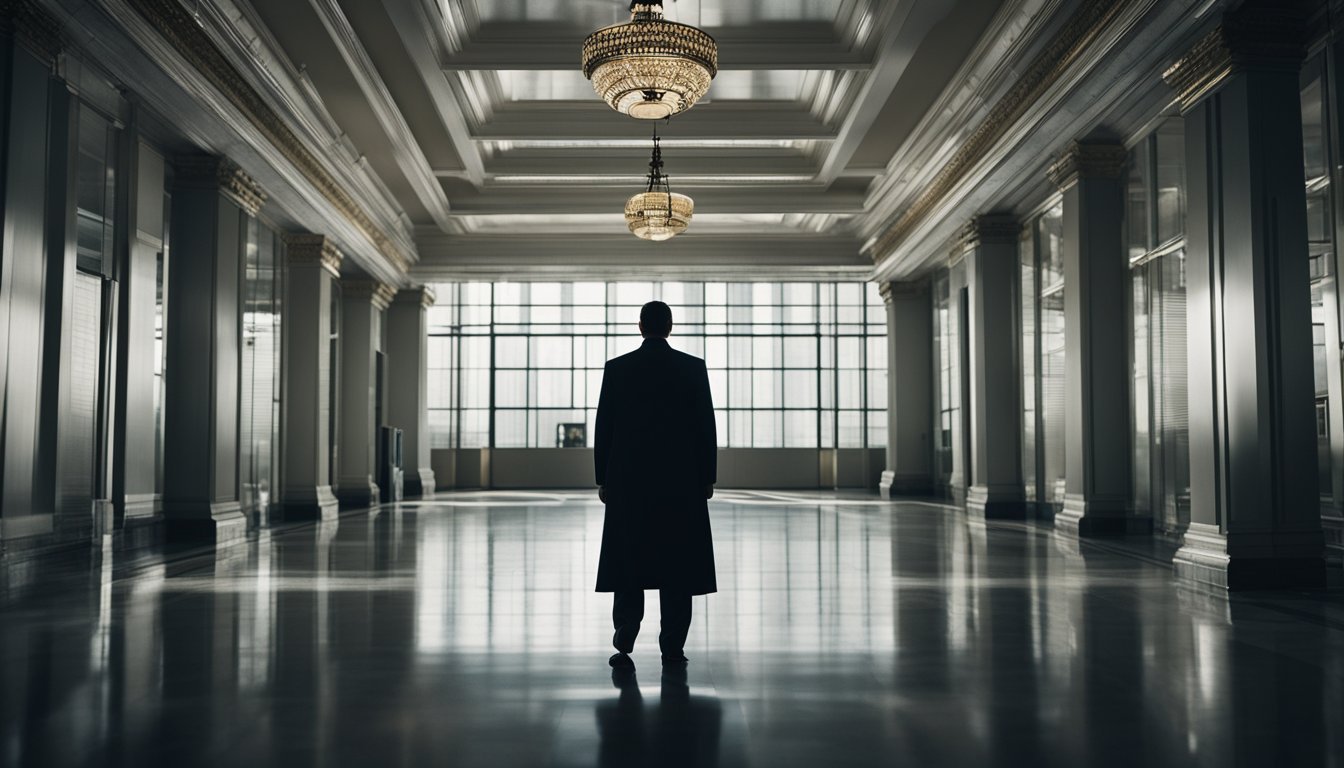5 True Crime Documentaries About Corruption Among Politicians
Riveting Exposés You Need to Watch
Corruption among politicians is a theme that often graces the screens of true crime documentaries, drawing viewers into intricate tales of deceit, power, and betrayal. These films unveil the hidden operations and dark secrets of political figures who have abused their positions for personal gain. For those interested in uncovering the unsettling realities of political misconduct, true crime documentaries offer a captivating blend of investigative journalism and storytelling.
True crime documentaries about political corruption provide critical insights into the inner workings of government structures and the ethical lapses that sometimes occur within them. They present real-life cases that highlight the consequences of corruption on both the political landscape and the lives of everyday people. Audiences can gain a deeper appreciation for the complexities of governance and the vigilance required to uphold integrity in public office.
1) "All the Queen's Horses" (2017)
"All the Queen's Horses" is a documentary film directed by Kelly Richmond Pope. The film investigates the largest municipal fraud in American history, committed by Rita Crundwell.
Crundwell embezzled $53.7 million from Dixon, Illinois over two decades. As city comptroller, she used the funds to create a leading quarter horse breeding empire.
Her actions led to significant budget cuts, including reducing police funding and neglecting public infrastructure. The documentary provides a detailed examination of her crime and the impact on the small town she left behind.
"All the Queen's Horses" features numerous interviews and showcases the technical prowess typical of Kartemquin Films.
For more information, check IMDB.
2) "Client 9: The Rise and Fall of Eliot Spitzer" (2010)
"Client 9: The Rise and Fall of Eliot Spitzer" is a documentary directed by Alex Gibney, exploring the scandal that ended the political career of Eliot Spitzer.
The film delves into Spitzer's tenure as the Governor of New York. Once regarded as a rising star in the Democratic Party, his career ended abruptly.
Spitzer, known for his no-nonsense approach to politics, faced a significant public and political backlash. He was caught in a prostitution scandal that overshadowed his accomplishments.
The documentary provides insights from various key figures involved in Spitzer's downfall. This includes interviews that shed light on the intricacies of the scandal and its impact.
The film premiered at the 2010 Tribeca Film Festival and was released on various platforms later that year. It portrays not just Spitzer's personal flaws but also the political machinations that led to his resignation.
For more information about the film, visit the Wikipedia page.
3) "The Family" (2019)
"The Family," released in 2019, delves into a secretive Christian organization known as The Fellowship. It explores their influence and alleged control over political figures in Washington, D.C.
The documentary is based on the work of author Jeff Sharlet, who spent years investigating this group.
The Fellowship claims to promote Christian teachings. However, the film raises questions about their true intentions and methods.
Their network extends globally, impacting political decisions far beyond the U.S. borders.
For more detailed information, visit "The Family" on IMDb.
4) "The Great Hack" (2019)
"The Great Hack" examines the Cambridge Analytica scandal and its impact on data privacy. The documentary spotlights how data became a powerful tool in political campaigns, significantly influencing voter behavior.
The film features key figures like academic David Carroll and whistleblower Christopher Wylie. They reveal the inner workings of Cambridge Analytica and its controversial data practices.
The documentary also explores the broader implications of big data as a commodity. It highlights concerns about privacy and the ethical use of personal information in the digital age.
For more information on the film, visit "The Great Hack" on IMDb.
5) "Get Me Roger Stone" (2017)
"Get Me Roger Stone" dives into the career of Roger J. Stone Jr., a political consultant known for his influence in American conservative politics.
The documentary tracks his journey from his work with Richard Nixon to his role in securing Donald Trump's 2016 presidential victory.
Roger Stone himself narrates portions of the film, providing insight into his controversial strategies and political maneuvers.
The film portrays Stone as a figure who thrives on scandal and attention, unapologetically embracing his reputation.
Utilizing interviews with various political figures, the documentary paints a vivid picture of the man behind the scenes.
For more information on "Get Me Roger Stone," visit IMDb.
Historical Context of Political Corruption
Political corruption has existed for centuries, influenced by key events and major scandals that shaped the political landscape worldwide. From ancient civilizations to modern governments, corruption has repeatedly surfaced, driven by power, money, and influence.
Key Events and Developments
Historical records reveal instances of corruption dating back to ancient Rome, where public officials engaged in bribery and embezzlement. The fall of the Roman Republic was partly attributed to such malpractices, eroding trust in governance.
The Renaissance period saw the rise of corrupt practices among European monarchies. The sale of indulgences by the Catholic Church, which Martin Luther opposed in the Reformation, is a notable example.
In the 19th and early 20th centuries, the Progressive Era in the United States marked a significant response to widespread political corruption. Reforms like the civil service system aimed to curb patronage and bribery.
Major Scandals Over the Decades
The Watergate scandal in the 1970s remains one of the most infamous examples of political corruption in the United States. President Richard Nixon's involvement in illegal activities led to his resignation, shedding light on the misuse of power.
In the 1980s, the Iran-Contra affair exposed illicit arms sales by the Reagan administration to fund Nicaraguan rebels. This scandal highlighted the complexities and covert operations within government.
More recently, the Panama Papers in 2016 unveiled a global network of offshore accounts used to hide assets, implicating numerous political figures and triggering widespread investigations.
The 2000s also saw corruption scandals such as those surrounding Brazilian state oil giant Petrobras, leading to the "Operation Car Wash" investigation. This far-reaching probe uncovered a vast system of kickbacks and money laundering involving politicians and business executives.
Impact of Political Corruption on Society
Political corruption has far-reaching effects, impacting economic stability and shaping public trust. These consequences can erode democratic values and societal well-being, influencing life in various substantial ways.
Economic Consequences
Political corruption distorts economic development. Funds intended for public services and infrastructure may be diverted, delaying or preventing essential projects. This misuse of resources can lead to inadequate healthcare, education, and transportation services, which hampers long-term economic growth.
Reduced foreign investment is another critical issue. Investors often avoid regions known for high corruption due to the increased risk of bribery, project delays, and legal uncertainties. This can stymie economic expansion and innovation in the region.
Moreover, corruption increases inequality. Wealth tends to concentrate in the hands of a few, usually those associated with or supportive of corrupt officials. This lack of equitable wealth distribution can lead to social unrest and diminish the quality of life for the general population, creating a cycle of poverty and disenfranchisement.
Public Trust and Perception
Public trust erodes significantly in environments rife with political corruption. When citizens perceive that their leaders are self-serving rather than public-serving, it undermines faith in democratic institutions. This skepticism can result in lower voter turnout and disengagement from political processes.
Transparency and accountability suffer as corrupt officials manipulate or bypass laws to avoid detection and punishment. This lack of openness can make citizens feel powerless and mistrustful of governance mechanisms.
Corruption also shapes negative perceptions of government efficiency and fairness. Citizens may doubt the legitimacy of their government’s actions and decisions, viewing them through a lens of corruption and self-interest. This erosion of trust can lead to civil disobedience and, in severe cases, promote anti-government movements, which further destabilize society.
Techniques Used in Investigative Documentaries
Investigative documentaries employ meticulous research, thorough fact-checking, and strategic interviewing to uncover corrupt practices and present a compelling narrative.
Research and Fact-Checking
Thorough research is the backbone of effective investigative documentaries. Filmmakers collect vast amounts of data from various sources, such as public records, leaked documents, and government reports.
Fact-checking is essential to maintain credibility. Every claim is cross-verified using multiple sources. Journalists frequently collaborate with experts to interpret technical and legal documents accurately. Data analysis software can also help manage and analyze large datasets, such as financial transactions and communications.
Gathering firsthand accounts from whistleblowers and insiders further strengthens the validity of the research. Archival footage and photographs serve as visual evidence to corroborate the findings, enhancing the documentary's authenticity.
Interview Methods
Interviews play a crucial role in investigative documentaries. Directors often seek out key witnesses, experts, and those directly involved in the case. In-depth interviews allow for detailed explanations that written records may not capture. The filmmakers prioritize open-ended questions to elicit comprehensive and candid responses.
Sometimes, hidden cameras and undercover techniques are used to expose wrongdoings not otherwise visible. Ensuring anonymity for sensitive sources is vital for their protection. Different perspectives are included to present a balanced view.
The juxtaposition of interviews with documentary footage creates a powerful narrative that holds the audience's attention and imparts the gravity of the corruption being investigated.




